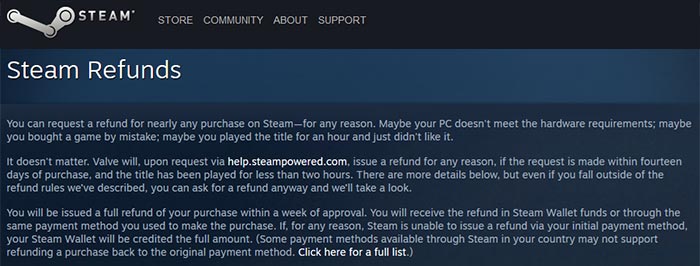Back in 2014 the Australian consumer watchdog took Valve to court due to complaints over its lack of refund policy. After 18 months of legal wrangling, the Australian Competition and Consumer Commission (ACCC), and the Australian Federal Court have now ruled that Valve was indeed in breach of Australian Consumer Law. Liability and legal costs payments are to be decided at a later date.

At the start of the case, the ACCC asked Valve implement the following, reports Kotaku:
- Provide an email address that specifically deals with refunds as per Australian Consumer law.
- Provide a 1800 number to help consumers address any refund issues.
- Provide a PO Box address for consumers to deal with refunds.
- Appoint representatives (the ACCC refer to this person as a contact officer) to reply to consumers regarding refunds.
Australian consumer law requires a refund policy to be in place. Valve's initial defence was that it didn't officially conduct business in Australia but only provided access to an online portal for video games via a client; it denied this constituted the supply of 'goods' as defined by Australian law. Furthermore Valve asserted that its Steam Subscriber Agreement – to which gamers worldwide agree – is the law of the State of Washington USA, not Australian law.
The Australian court has disagreed with Valve's assertions of whether it is conducting trade in Australia or not. "The Federal Court’s decision reinforces that foreign based businesses selling goods and/or services to Australian consumers can be subject to Australian Consumer Law obligations, including the consumer guarantees," said ACCC Chairman Rod Sims. "In this case, Valve is a US company operating mainly outside Australia, but, in making representations to Australian consumers, the Federal Court has found that Valve engaged in conduct in Australia. It is also significant that the Court held that, in any case, based on the facts, Valve was carrying on business in Australia."
Furthermore Sims noted that this was the first time that the courts had extended the definition of goods to include software. This ruling looks set to have a big impact on consumer confidence in buying digital goods. Of course, between 2014 and the present day Valve has implemented a worldwide 14-day refund policy.

A hearing has been scheduled for 15th April to discuss potential relief payments from Valve. Kotaku reckons that in addition to any liability payments that may be set, Valve will have to pay up to 75 per cent of the ACCC's legal costs.













